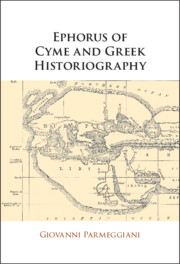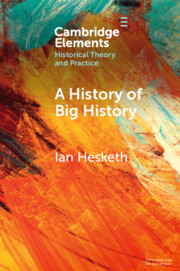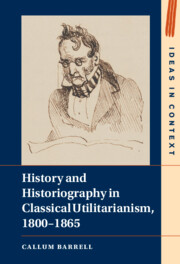Refine search
Actions for selected content:
13 results
Chapter 4 - Ephorus the Universal Historian
-
- Book:
- Ephorus of Cyme and Greek Historiography
- Published online:
- 30 November 2023
- Print publication:
- 14 December 2023, pp 332-359
-
- Chapter
- Export citation

Ephorus of Cyme and Greek Historiography
-
- Published online:
- 30 November 2023
- Print publication:
- 14 December 2023

A History of Big History
-
- Published online:
- 22 May 2023
- Print publication:
- 15 June 2023
-
- Element
- Export citation
Chapter 8 - Technology, Writing, and Place in Medieval Irish Literature
- from Part III - Invention
-
-
- Book:
- Technology in Irish Literature and Culture
- Published online:
- 19 January 2023
- Print publication:
- 26 January 2023, pp 137-153
-
- Chapter
- Export citation
Chapter 8 - Durkheim: Functionalism
-
- Book:
- Diagnosing Social Pathology
- Published online:
- 07 October 2022
- Print publication:
- 27 October 2022, pp 156-191
-
- Chapter
- Export citation
Chapter 10 - Durkheim: A Science of Morality
-
- Book:
- Diagnosing Social Pathology
- Published online:
- 07 October 2022
- Print publication:
- 27 October 2022, pp 229-254
-
- Chapter
- Export citation
Chapter 7 - Durkheim’s Predecessors: Comte and Spencer
-
- Book:
- Diagnosing Social Pathology
- Published online:
- 07 October 2022
- Print publication:
- 27 October 2022, pp 139-155
-
- Chapter
- Export citation
Chapter 6 - J. S. Mill on Universal History
- from Part III - Sciences of History
-
- Book:
- History and Historiography in Classical Utilitarianism, 1800–1865
- Published online:
- 24 September 2021
- Print publication:
- 07 October 2021, pp 185-219
-
- Chapter
- Export citation

History and Historiography in Classical Utilitarianism, 1800–1865
-
- Published online:
- 24 September 2021
- Print publication:
- 07 October 2021
Chapter 2 - Monastic History and Memory
- from Part I - Time
-
-
- Book:
- Medieval Historical Writing
- Published online:
- 19 December 2019
- Print publication:
- 28 November 2019, pp 35-50
-
- Chapter
- Export citation
Chapter 3 - Apocalypse and/as History
- from Part I - Time
-
-
- Book:
- Medieval Historical Writing
- Published online:
- 19 December 2019
- Print publication:
- 28 November 2019, pp 51-66
-
- Chapter
- Export citation
13 - Before the farmers: culture and climate, from the emergence ofHomo sapiensto about ten thousand years ago
- from Part II - The Paleolithic and the beginnings of human history
-
-
- Book:
- The Cambridge World History
- Published online:
- 05 May 2015
- Print publication:
- 09 April 2015, pp 313-338
-
- Chapter
- Export citation
‘But from this time forth history becomes a connected whole’: state expansion and the origins of universal history*
-
- Journal:
- Journal of Global History / Volume 9 / Issue 3 / November 2014
- Published online by Cambridge University Press:
- 13 October 2014, pp. 357-378
-
- Article
- Export citation
